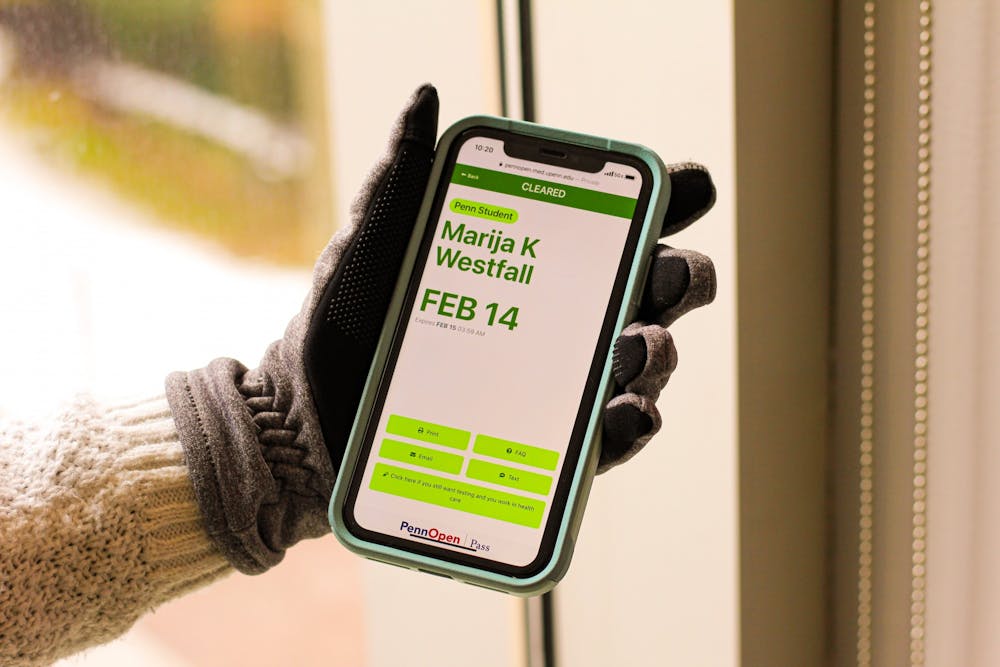It would be an understatement to say that living with COVID-19 has been both arduous and precarious, as it has seemingly become our new normal. However, the time has come to begin transitioning to life as we knew it prior to COVID-19. Penn should no longer have the mask mandate in indoor spaces, obligatory testing, or require PennOpen Pass.
Recently, data from The New York Times shows that national trends in COVID-19 case rates, hospitalizations, and deaths have been declining significantly — a trend that is especially reassuring given Omicron’s recent domination across the globe. In the past two weeks alone, cases went down 48%, hospitalizations went down 43%, and deaths went down 31%. More specifically, in Philadelphia County, cases went down 57% and hospitalizations went down 44%.
Philadelphia County recently adjusted to these positive trends themselves by dropping their indoor mask mandate. The Philadelphia Department of Public Health stated that “the metrics that we’re following have reached the level where the Health Department feels it is safe to stop enforcing the indoor mask mandate.”
Even within Philadelphia County, Penn’s bubble has a special advantage over other communities: its vaccination rates. At least 99% of the undergraduate student population is fully vaccinated, and over 60% of the Penn community has reported having been inoculated with the booster. This number is expected to be even higher in the coming weeks considering Penn’s requirement to upload proof of a booster shot by Mar. 14. Furthermore, the CDC considers Philadelphia County to be a low risk level area — which means that masks are not required for those who are fully vaccinated.
Although Penn hasn’t changed its COVID-19 recommendations, many peer institutions have already adjusted theirs. Northwestern University lifted its mask mandate on Feb. 28. Harvard University, Columbia University, and Vanderbilt University recently made plans to lift theirs on March 14, with Columbia removing daily symptom checks afterwards as well.
But despite the encouraging trends in COVID-19 data, Penn’s COVID-19 policies have continued to remain especially stringent. Not only does the University require masks at all indoor functions, it also requires daily symptom checks with PennOpen Pass and biweekly testing. But such policies are unnecessary; in reality, there is only one area of campus where it is reasonable to have continued mask-wearing: classrooms. Mask-wearing in classrooms is especially helpful at hindering transmission. Whether or not masks should be worn in the classroom should ultimately be the professor’s decision. Professors are of variable ages and are at increased risk of COVID-19 compared to younger college students, who socialize outside the classroom often and without masks.
Mask mandates should most definitely be removed from all indoor areas that are not classrooms, especially in campus fitness centers such as Pottruck. Wearing masks during workouts, particularly cardio-intensive workouts, not only causes discomfort by making breathing more difficult, but also causes potential health risks among wearers — including, but not limited to, increased stress on the heart, lightheadedness, and dizziness.
Furthermore, PennOpen Pass is a system that many students have qualms with, particularly because of its inconsistency of use across campus. Despite the goal of PennOpen Pass to give students a green screen signifying that they have not been exposed to COVID-19 nor have symptoms, many students lie about both with ease. Even testing itself should only be required for the symptomatic, a recommendation made by the Children’s Hospital of Philadelphia.
SEE MORE FROM ALLISON SANTA-CRUZ
The unprecedented times we have been praised for so resiliently living through need to come to an end. The urge to return to normal is not unfounded, as many students would benefit from returning to a less stressful COVID-centric environment. We can only hope that Penn recognizes its time to seize that opportunity.
ALLISON SANTA-CRUZ is a College first year studying philosophy, politics, and economics from Jackson, Miss. Her email address is allisant@sas.upenn.edu.









